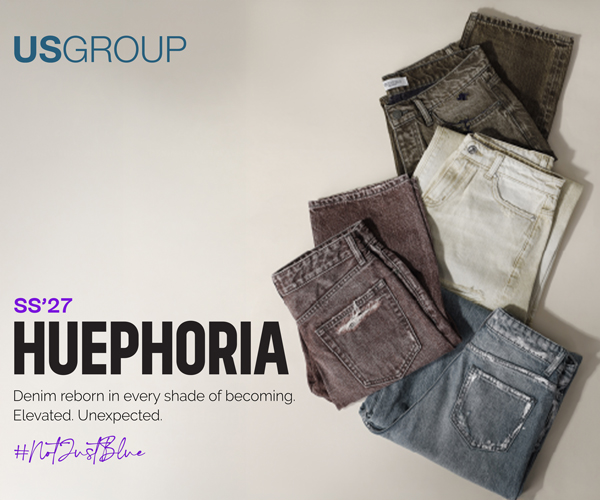Ampelio Dal Lago: Creativity is the driving force

Ampelio Dal Lago, AFM’s creative director, has been with the group since 2007. He started his career in 1989 at Montebello in Italy, where he progressed up the ranks from dyeing manager to head of R&D, and has also worked at Corduroy in Mexico and Calik in Turkey.
Q Can you tell us a bit about your achievements in the industry so far, and which you are most proud of…
A I’ve been working in denim for the last 30 years. I started as a dyeing manager and worked my way up to heading the R&D teams as well as overseeing production. I am most proud of the teams that I have built over these years, grooming the next generation of denimheads and collaborating on new ideas to sustainably innovate denim.
What excites you about your role and which element of it do you enjoy most?
Creativity. I love researching new ideas and techniques, my entire career is based on it. From carrying out crazy trials like coloured sulphur bottom in ’89, to bromo indigo in ’92 and mercerisation in ’96, to now pushing to make the most sustainable denim, not only in composition but also in dyeing and finishing, there’s always a new idea to work on.
What do you strive for when creating new fabrics? Are there any that you’re particularly excited about?
We’re always striving to find newness in product - from how it performs, to modifying machinery or playing with fibres to create new blends. It’s very rewarding to achieve what you had in mind after several trials. Currently, I’m most excited about our pre-consumer waste collection called Phoenix. We are trying to reduce mill waste while creating the most sustainable denim.
From the mill side, what pressures do you feel in terms of sustainability, and is there anything you wish was more widely understood?
For us, sustainability is a mission. We started working on sustainable denim back in 2013 with zero results, but we didn’t give up. Today we are one of the leaders in this area with our own cotton recycling plant and breakthroughs in chemical engineering to reduce the use of chemicals and water in dyeing and finishing. AFM invests in sustainability heavily so there is no pressure in terms of what we can achieve. The main problem is that sometimes the market doesn’t understand certain efforts, especially on the dyeing and finishing side, but we’re still proud of our results there.
Do you think the volume of new products is correct, in terms of how many options mills offer to clients?
The volume of new products flooding the market is too high. Mills definitely need to focus more on pushing for real innovation and not just evolution of existing products every season.
How do you select your downstream suppliers (fibres, chemicals, etc) how important are these relationships to your overall offering?
Suppliers are just as fundamental for us as we are for our customers. We have always had an open door policy and give a lot of new suppliers a chance to showcase their products as it’s important for us to see what innovation there is in the market which helps to spark our own creativity when it comes to denim development. Right now, we are focusing on suppliers who have sustainable chemicals, finishes, fibres and techniques to offer as that is imperative to our development goals.
How has the pandemic altered your work, and what is being put in place to offset any interruptions? Do you see it having long-lasting effects?
Covid-19 has halted a well-running machine. It’s going to take at least two years to rebuild the industry. However, it’s also a time to reset the way we work and we have adopted a digital way of working through webinars, zoom calls and online product presentations to reduce the distance across borders. It’s more challenging on the production and development side though, because the way we work we need to be surrounded by the machines where the action is.
How does having a vertical operation – in terms of spinning, weaving and garments – help in terms of the end products you create? How does recycling fit into this?
A vertical set-up helps us control the supply chain and be transparent with our operations. It also helps to bring concepts to life from fibre to finish. Recycling fits perfectly in our vertical set-up because, again, sustainability is a mission for us and from my point of view, a sustainable denim fabric is only as good as its laundry treatment. If the laundry has a huge environmental impact, you’re only offsetting the savings on the mill side. But if both mill and laundry are mindful of the processes they’re using, we can truly provide the end consumer with a sustainable garment.
You have mentioned that you think work needs to be done on marketing Pakistan as a sourcing destination. How would that help the industry there?
Pakistan’s denim manufacturers have proved their competence on a global level over the years against all odds and have showed great capability in providing solutions to brands in terms of products and also environmental and social compliance. They have taken feedback, invested in their operations and their people and we can see the evolution since today, some of the leading companies in the denim industry are from Pakistan. By drawing attention to the advancement Pakistan has made in the textile industry, and by attracting more business opportunities to the country, we can further enhance the capabilities of these companies and with that the lives of thousands of denim workers in the country and its infrastructure.
How do you see the industry evolving and what do you hope for the future?
Sustainability, circularity and social compliance has given the industry targets to pursue. We are grateful to brands that understand the merits of working sustainably and the amount of investment it takes to make this happen. I hope this trend continues as it’s the only way to care for our earth and its people, especially after we have seen the effects of a global catastrophe. I hope that people can once again learn to trust their surroundings, relax and be able to go to a shop and buy a beautiful new pair of jeans!
Pakistan-based Artistic Fabric Mills (AFM) is one of the region’s leading denim fabric and garment manufacturers.












